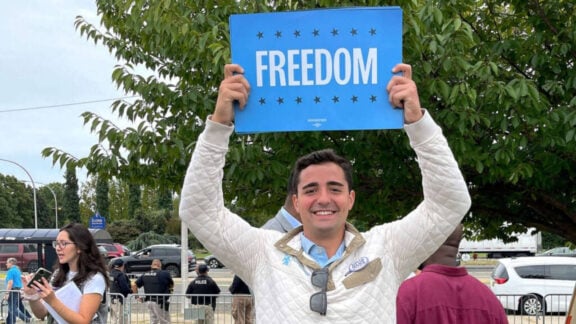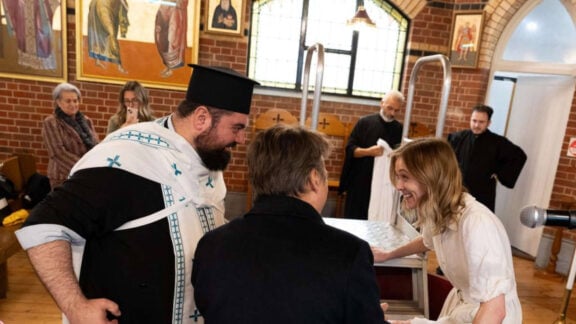The notion of a ‘family business’ is deeply rooted in Greek culture, but for Chris Gogos, the significance of this ‘family business’ far exceeds the limits of his home, spreading to the broader Greek community of Melbourne and Australia – if not the Greek diaspora as a whole.
Now that Neos Kosmos is celebrating six decades of continuous presence, Chris remembers the first time that he visited ‘dad’s workplace’ and offers his musings on the paper’s past, present and future.
What is your first Neos Kosmos memory?
My first memories are from when we were at the Russell Street building, back in the 70s. I was five or six years old and as a young boy, I remember it was like a rabbit warren. I remember the smell: a mixture between an office and a printing press; it had a metallic smell because they still had the old letterpress machines then.
All this was very interesting, this crazy world of publishing. Now it’s all very sterilised. Sometimes, our columnist Babis Stavropoulos jokes that it reminds him of an insurance company. At the time, because we were near the Lonsdale Street corner, the whole precinct had a Greek community vibe to it, similar to how Oakleigh is today. There was a number of Greek establishments and the office was very busy, with lots of phone calls, people coming in and out, lots of craziness. I thought that this is where my father works, this is what he does. It was busy but at the same time normal.
Would you have thought that this is what you’d be doing someday?
Not at five years old. My father was never a person to push you into doing something, he led his own life. He liked me being around, but it was never put in my mind that this is something that I should be doing. That came much later. I sort of discovered it myself, on my own.
When did you discover it?
It was in the early 1990s that I first got really involved in Neos Kosmos. My father wanted to produce a community television program and because I had a background in television, media and film studies, I had enough knowledge, and practice, to produce a community program, and that got me involved. Through this involvement I gradually got to understand what Neos Kosmos is, and I got to understand the community a lot better too. I understood that it is a form of communication and it is something that is well established and respected by a lot of people and I thought that I could contribute to this. And this is how I started.
Following the TV show I got involved in the production side of things, trying to see how we could make improvements in technology and modernise the paper and business. I was never initially involved in the editorial and journalistic side, that came later.
I began to see a future and see that we have become a voice that also passes generations, not just for the first migrants.
Up until that time, what did the paper mean to you?
I suppose it was not dissimilar to most people’s view. I had a sense of respect for what we were doing which was also reflected from the community and the readers. Being around the community everyone seemed to be proud of what the paper was and how it represented them.
I also developed my own respect, independent of that, because I knew how we worked; I knew the people involved; I knew the dedication and the internal debating about topics and the quality of the product – both as a physical thing and the quality of journalism.
How did you see this relationship with the community evolve through time?
I think inevitably one of the greatest challenges we always had, and my father foresaw it back in the early 70s, was that language is going to play a big role in the transition of the newspaper. We started printing English pages, it sort of built up at the time and it grew, because a lot of second- and third-generation [readers] did not have a proficiency in Greek language.
So I knew that we had to publish more English stories, because the needs of Greek-speaking readers are very different from the needs of our English-speaking readers. We’re a community voice for them and a point of information but it’s much broader than it used to be. It’s really been the advent of the internet that has made that transition much more viable. The internet has helped us really get to more people [more quickly]. We’re on the verge of launching a new website which is very user-friendly. So we’re trying to be even better at that; listening to what our readers want.
Neos Kosmos‘ online edition attracts much traffic from the broader diaspora; how does this affect its role as a medium?
It’s actually an enormous opportunity for us to continue to grow and reach the diaspora and Greece as well. There are a lot of people in Greece, whether they are expats or they have an interest in Greeks abroad, that are reading us and this growth potential over the last few years has been positive.
Of course, we have to be aware of our own limited resources and be careful not to try and be everything to everyone, because we can’t. We have to be careful to maintain our good qualities and nurture them in order to become better. As the person in charge of running it as a business and having to pay for good journalism and contributors, my role is to create the business model for the digital age, so that it becomes sustainable and continues to grow.
This is the greatest challenge media organisations face at the moment; how do you tackle it?
I think that the way to tackle it is to do exactly what we are doing for the newspaper but with a completely modern mindset, which is a view towards digital. You need to provide the information that you would provide in a newspaper environment, but produce it differently for a digital environment. You’re really governed by what people are interested in. As a relatively small business, we may have limited resources, but we do have flexibility. We don’t have a big bureaucracy in order to do something new. We just have to be a little bit more strategic and do our homework. We’re very independent, we listen to our readers and adapt to what they want.
What is your aspiration for the future of Neos Kosmos?
Judging by our continued growth in readership, I can see us continuing to cater for the needs of the diaspora as a whole and really be known as a respected voice for the Greek diaspora.
Obviously we’re based in Melbourne and we’re very supported by the community here, but we already produce a lot of content that is not Melbourne-specific; stories and information that is of interest for people of Greek heritage. First of all it’s about the content; you need to provide the information that people want. Then it’s the timeliness of it and the user experience. We need to do all those things well.
If we do that well, we’ll have the opportunity to gain habitual followers internationally. So, our aspiration is to be a quality global voice in what we do.
Looking back over Neos Kosmos‘ 60 years of history, what is it that inspires you the most?
I think it is that I have seen Neos Kosmos being able to communicate with a lot of people through the years, and connect with them and actually help them and be a voice for them but also a Greek voice within the broader community. I was only a kid but we helped a lot of people get a foot in the country.
It’s very powerful and fulfilling to be able to make a difference and be heard. This is a really important role and it hasn’t changed in time. We are looked upon as one of the most successful examples of multiculturalism – especially by politicians – because we did fight in the early days for multiculturalism.
Neos Kosmos is one of the pillars of the Greek Australian community; what does that mean to you?
We are considered a pillar and we do have an important role within the community. It’s our responsibility to communicate what’s happening in the community, whether it is information or managing debates that are going on in the community.
Our responsibility is to present them fairly and be respectful of all the different voices in the community and allow them to have exposure, so long as they are reasonable and not extremist – that’s the only place where we draw the line. To allow debate and allowing our own viewpoint as well. This is a great responsibility.
Because when we say ‘Greek Australian community’ it sounds homogenous but it’s not; we all come from different socioeconomic backgrounds and we have different political beliefs.
Our community is a large community but it’s also relatively small – we need to make room for everybody. We need to allow all voices to be heard.
On a personal level, what is your perception of your own identity as a Greek Australian?
It’s a little complex. Some of us had the opportunity to spend parts of our lives in Greece, so whilst I was born here, I had the pleasure of living in Greece for more than a decade and then come back.
I feel very privileged to have had this upbringing; I can see the great things of our culture here both as Australian and Greek Australian, but also all the great things in the motherland.
Greece is an incredible country with it’s particular lifestyle; it has an ease of living, that I find humane. That has nothing to do with having a Greek background; I’ve had Australians of non-Greek background tell me the same. Of course, there are also some negative aspects, that we re all aware of.
As for Greek Australians, there is a sense of proudness in having a Greek heritage, which is part of our culture, how we are brought up. I’ve seen this in everyone, from people who are very involved in the community to people who are dissociated and don’t even speak Greek.
Their essence, how they value their everyday life and live it moment to moment, is uniquely Greek. And it’s always there.









